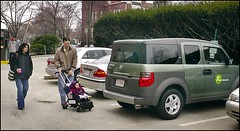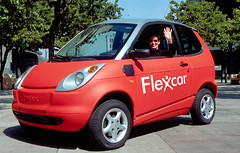Dr. Transit--Car Sharing in DC
 Matt Clausen and Margarita Diaz use a Zipcar for errands. Owning a car "was more of a hassle than anything," he said. (Gerald Martineau -- The Washington Post)
Matt Clausen and Margarita Diaz use a Zipcar for errands. Owning a car "was more of a hassle than anything," he said. (Gerald Martineau -- The Washington Post)"Matt Clausen's friends told him he was crazy. Absolutely nuts. How in the world did he and his wife expect to take care of a new baby if they got rid of their only car? How would they get to the doctor's office? See their friends? Clausen harbored his own doubts, but he had also done some math. He was paying $450 a year in insurance and $800 in repairs, plus gas and other nagging costs. The hassle equation didn't add up, either: His station wagon broke down a lot, and he was sick of hunting for parking."
"'It seemed like a car was more of a hassle than anything else,' said Clausen, of Capitol Hill, who, with his wife, Margarita Diaz, spent about $1,000 on Zipcar the first year they tried it. 'I wanted to have the freedom of having a car around in case I needed it, but it ended up sitting out on the street all the time. Zipcar . . . tipped the scales for me.'" (From today's Washington Post, "More Area Car Owners Shift to Hourly Rentals".)
The printed Post article has a chart comparing the costs of the two services. One to my way of thinking is a better buy...
____
So the family ends up saving money, a lot of money, and since the car goes into a dedicated space, they don't have to worry about finding parking.
I mentioned car sharing in a blog entry on March 10th (which by the way, at the time, I sent it to the journalist who wrote today's article):
"For occasional trips of this nature, car sharing services like Flexcar and Zipcar are good options. The article, "Clearing the Roads: Would you give up your car if you could share one instead? How a hot concept could ease gridlock discussed" appeared in the February 21, 2005 issue of Time Magazine and among many points made in the article, it asserts that every shared car takes 10 other cars off the road. (The Time Magazine article is technically premium content but was read into the entry above, so you can read the whole thing.)
Last fall, the Post ran an article about car sharing in Arlington, in "Out of the Driver's Seat: Arlington Residents Increasingly Choose to Shift Into a Carless Lifestyle". Arlington County has focused developing high-density uses along the Orange Line in the Rosslyn-Ballston-Wilson Blvd. corridor.
And the Voice of the Hill reports (as have other media outlets) that Flexcar and Zipcar are looking for dedicated street parking spaces in DC. While at first I had no problem with this, I did believe that they should pay a fee for the spaces, now I am not sure. Like HOV lanes that people complain about because they are seemingly under-utilized all the while they carry multiples of passengers compared to the regular travelling lanes, it might be that if we think of each shared car as removing 10 cars off the street, that we have a worthy trade-off.
[ANC6C, where Dr. Transit sits on the Planning and Zoning Committee, directed Abdo Development, the developers of the new Senate Square (ex-Children's Museum) condominium complex to offer parking slots to Flexcar and Zipcar, and they are in negotiation to do this. Hopefully, more ANCs will direct similar transportation demand management schemes when considering new developments, particularly those in easy walking distance to public transportation.]
Now I recommend that DC residents get a discount on the annual fee in return for providing dedicated street parking to Flexcar and Zipcar, because while worthy, it is still a somewhat private use of the public space. (See the "High Cost of Free Parking" blog entry in the March archive.)
 Photo from the Flexcar website.
Photo from the Flexcar website.Here's the Voice article:
City Wants to 'Flex' its Parking Rules BY AMY DOOLITTLE
A proposed regulation by District Department of Transportation (DDOT) suggests that city parking rules be amended to allow car-sharing programs, such as Zipcar and Flexcar, free on-street parking in designated spots, possibly in Capitol Hill neighborhoods and business districts.
The rule states that DDOT may "establish reserved on-street parking spaces for exclusive use of car-sharing vehicles." But by taking what neighbors see as extremely limited, highly valued on-street parking and giving it to a business, some say DDOT is stealing from them.
Reserving spots for shared-cars, ANC 6B Commissioner Ken Jarboe said, "takes away from parking on the hill and from evening residential parking. What of someone coming home at 10 p.m. at night who can't find a parking space because of those cars?"
Gabe Klein, Regional Vice President of Zipcar, said the goal of the car sharing programs is to eventually cut down on the number of cars on the road. Sharing cars and parking them in convenient Capitol Hill neighborhood spaces is an important step to bringing in new customers.
"DC is the third most congested metro area in the country," he said. "There are 115,000 new residents moving in and they need to know there is another option to owning a car."
Both car companies already have established fleets in the Washington area. Most of the cars are parked in private lots and at Metro stations. Expanding the program absolutely requires that there be more parking available on the hill that is safe and accessible to customers, Klein added.
The cars are "in ally ways and behind stores," he said. "With cars hidden in alleys certain people don't feel safe. Our goal is to create a safer, higher profile transportation system for people. DDOT wants to provide a way to do this."
Flexcar and Zipcar don't have a say over where the District has them park the cars, he said. They were instructed to come up with a list of possible spots, including ones in residential areas.
Zipcar's list contains 127 possible spaces, Klein said, but most of the spaces probably won't be approved for the 30 cars they would like to introduce to Capitol Hill because of snow removal and street cleaning zoning. But DDOT considers all parking spots fair game, whether they are in a residential area or not.
"I think that DDOT's position is that the parking spaces that the public uses are public spaces and they have been provided to the citizens at a subsidized rate for many years, and we were hoping that providing these spaces to the company would have jump start for this company to use these cars," said Chris Delfs, Ward 6 planner for DDOT. Rick Rybeck, deputy administrator of the department who is overseeing the program, didn't return calls for comment.
Also presented in the proposed regulation was a rule change that would allow DDOT to change regulations with no public notice and only 30 days notice to the ANC. Members of ANC6B Zoning and Planning commission found this proposal "totally inappropriate," said Jarboe, and was also addressed in their letter to DDOT regarding the parking.
For now the parking debate is out of the ANC's control and back in the hands of DDOT, who must decide what to do in light of ANC 6B's bucking the plan. Until they bring the matter back to the table, the subject will not find an official place in a council meeting, Jarboe said.
"We have officially commented on those regulations. Until DDOT comes back there is no place in the process for this. Basically we are waiting for DDOT," he said.



0 Comments:
Post a Comment
<< Home